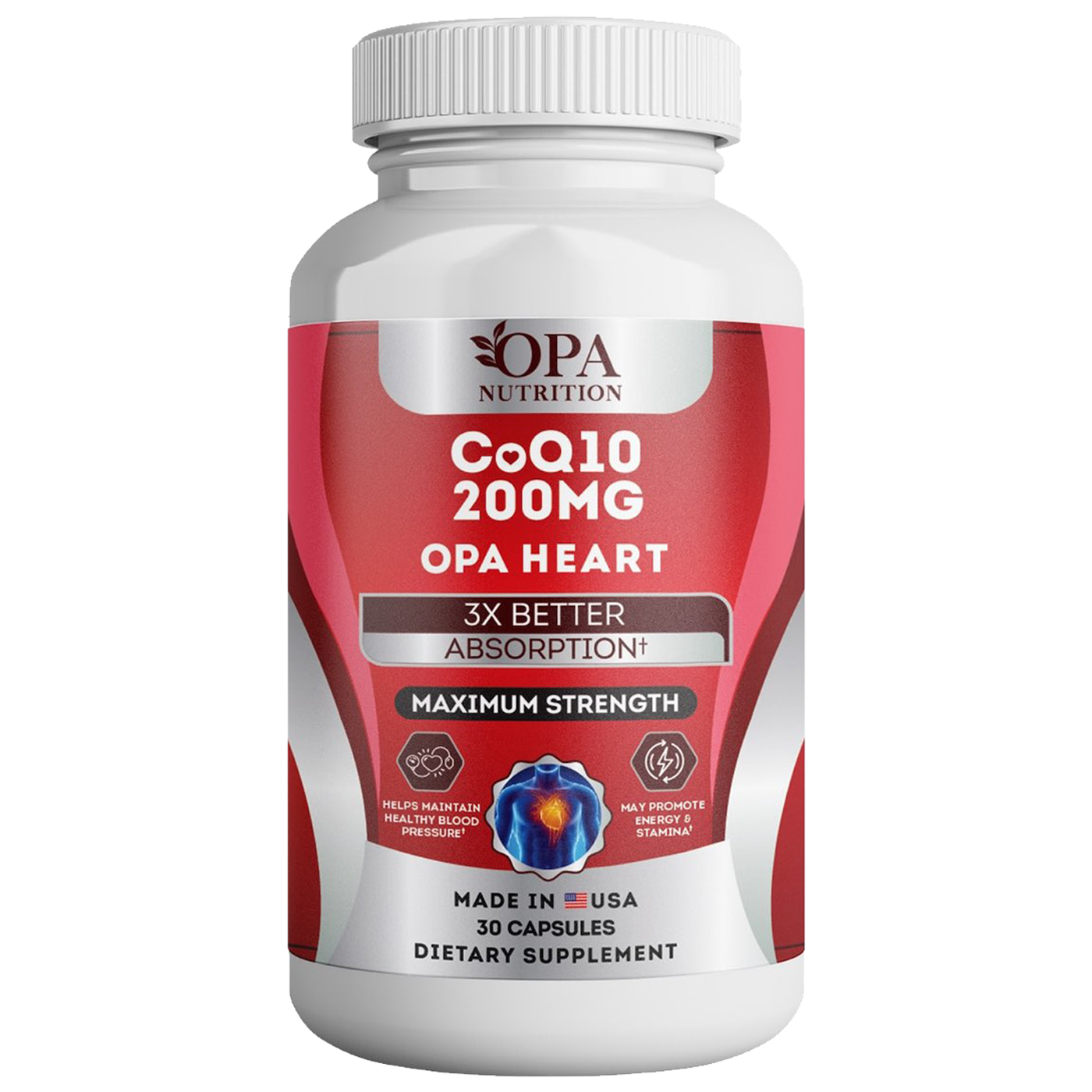Did you know that a powerful antioxidant, CoQ10, could be the key to unlocking numerous health benefits for women? From heart health to skin rejuvenation and even fertility, this versatile enzyme may hold the answers to many common health concerns. In this blog post, we’ll explore the science behind CoQ10 and its potential coq10 benefits for women, backed by clinical research and expert insights. So buckle up and get ready to discover the astonishing power of CoQ10 and When should women start taking CoQ10?
Short Summary
CoQ10 has been linked to potential heart health benefits for women, including reducing the risk of cardiovascular disease and improving heart function.
CoQ10 may reduce inflammation and oxidative stress, potentially providing relief from migraines in women.
Supplementation of CoQ10 can improve fertility outcomes as well as provide antioxidant protection against skin aging and fibromyalgia symptoms.

OPA Heart
The #1 CoQ10 for Heart Health
CoQ10 and Women's Heart Health

Coenzyme Q10, or coenzyme q10 coq10, is a naturally occurring enzyme that plays a critical role in cellular energy production and functions as a powerful antioxidant. It is believed that CoQ10 may offer significant benefits for women’s heart health, including reducing the risk of cardiovascular disease, improving heart function, and even protecting against heart damage induced by certain chemotherapy drugs.
How exactly does CoQ10 accomplish these feats? We will now discuss each of these potential benefits in more detail.
Cardiovascular Disease Risk Reduction
CoQ10’s ability to reduce inflammation and oxidative stress is believed to play a key role in its potential to lower the risk of cardiovascular disease, including heart disease, in women. In fact, studies have shown that CoQ10 supplementation can effectively reduce inflammation in individuals with coronary artery disease who take statins.
However, keep in mind that research on CoQ10 and statin-related muscle pain has not always yielded consistent results. Nevertheless, considering its potential benefits, CoQ10 supplementation may be a valuable addition to a heart-healthy lifestyle.
Improved Heart Function
CoQ10’s impact on heart function is particularly promising for those with heart conditions or low CoQ10 levels. By enhancing the efficiency of energy production in the heart, reducing oxidative stress, and optimizing blood flow, CoQ10 may help improve heart function and potentially even provide benefits for individuals with heart failure.
Therefore, if heart health is a concern for you, CoQ10 supplementation could be a worthwhile addition to a comprehensive heart health strategy.
Protection Against Chemotherapy-Induced Heart Damage
Female cancer patients may also stand to benefit from CoQ10’s protective effects on the heart. Chemotherapy drugs, particularly anthracyclines, can cause heart damage, but CoQ10 has been shown to protect against this damage by decreasing oxidative stress, increasing energy production in the heart, and reducing inflammation.
While more research is needed to fully understand CoQ10’s role in mitigating chemotherapy-induced heart damage, its potential benefits make it a promising supplement for women undergoing cancer treatment.
CoQ10's Role in Migraine Relief for Women

Migraines can be debilitating for many women, but CoQ10 may offer some much-needed relief. Research has demonstrated that CoQ10 supplements can effectively reduce the frequency and intensity of migraines in women. It is thought that CoQ10’s ability to reduce inflammation and oxidative stress may contribute to its effectiveness in alleviating migraine symptoms.
We will now examine how CoQ10 may aid in providing migraine relief for women.
CoQ10 Benefits for Women: Reduced Inflammation
Inflammation is often implicated in the development of migraines, as chronic migraines may be attributed to inflammation of neurons and cells in the brain’s trigeminovascular system.
CoQ10’s potent anti-inflammatory properties may help reduce this inflammation, potentially alleviating migraine symptoms and providing relief for women who suffer from these painful headaches.
Lowered Migraine Frequency
CoQ10’s ability to reduce inflammation and improve mitochondrial function may also contribute to a decrease in migraine frequency for women. Studies have shown that women who take CoQ10 supplements experience significantly fewer migraines, making it a promising option for those seeking a natural approach to migraine relief.
Shortened Migraine Duration
Not only can CoQ10 potentially reduce the frequency of migraines, but it may also help shorten their duration. A 2018 meta-analysis concluded that CoQ10 was more effective than a placebo for reducing the length of migraines. Furthermore, it stated that taking CoQ10 as a supplement could lead to improved migraine outcomes.
This is welcome news for women who suffer from these debilitating headaches, as shorter migraine duration may mean less time spent in pain and a quicker return to daily activities.
CoQ10 and Female Fertility

Fertility challenges can be disheartening for women trying to conceive, but CoQ10 may offer hope in this area as well. Studies have suggested that CoQ10 may improve female fertility by enhancing egg quality, increasing conception rates, and providing antioxidant protection.
We will now investigate the potential role of CoQ10 in supporting female fertility.
Enhanced Egg Quality
CoQ10 has been shown to improve egg quality in women by increasing mitochondrial activity and reducing oxidative stress. Improved egg quality can lead to a greater likelihood of successful conception and a healthy pregnancy.
So, if you’re trying to conceive, CoQ10 supplementation may be worth considering as part of a comprehensive fertility plan.
Increased Conception Rates
In addition to enhancing egg quality, CoQ10 supplementation may also increase conception rates by improving the chances of successful implantation.
By supporting overall reproductive health, CoQ10 may help boost the likelihood of a successful pregnancy for women trying to conceive.
Antioxidant Protection
CoQ10’s antioxidant properties may also play a role in supporting female fertility by protecting eggs from oxidative damage. This antioxidant protection may further enhance egg quality and increase the chances of conception.
By safeguarding the delicate balance of the reproductive system, CoQ10 may prove to be a valuable ally in the journey to motherhood.
CoQ10 for Skin Health and Aging

As we age, our skin loses its youthful elasticity and begins to show signs of wear and tear. CoQ10 may hold the key to turning back the clock on skin aging by providing antioxidant benefits, reducing wrinkles, and improving skin elasticity.
We will now look into the ways CoQ10 may contribute to revitalizing and rejuvenating your skin.
Antioxidant Benefits
CoQ10’s antioxidant properties may help protect the skin from the damage caused by free radicals and environmental stressors. By neutralizing these harmful molecules, CoQ10 can help maintain the skin’s youthful appearance and support overall skin health.
Wrinkle Reduction
Women who take CoQ10 supplements may notice a reduction in the appearance of wrinkles, thanks to its antioxidant effects. Research has shown that CoQ10 can improve skin smoothness, increase collagen production, and reduce fine lines and wrinkles.
So, if you’re looking to achieve a more youthful complexion, CoQ10 supplementation may be the answer.
Improved Skin Elasticity
CoQ10’s ability to boost collagen and elastin production may also contribute to improved skin elasticity. These proteins are essential for maintaining firm, resilient skin, and CoQ10 supplementation may help ensure that your skin stays supple and youthful-looking as you age.
By supplementing with CoQ10, you may be able to reduce the appearance of wrinkles.
CoQ10's Impact on Fibromyalgia Symptoms

Fibromyalgia can be a challenging condition to manage, causing widespread pain, fatigue, and mental health issues for those who suffer from it. CoQ10 may offer some relief for women with fibromyalgia by reducing pain, decreasing fatigue, and improving mental health.
We will now delve into how CoQ10 may assist in alleviating fibromyalgia symptoms in women.
Pain Reduction
CoQ10 has been shown to reduce pain levels in women with fibromyalgia by decreasing inflammation and oxidative stress. This can lead to a significant reduction in pain-related outcomes, allowing women with fibromyalgia to experience a better quality of life and improved daily functioning.
Decreased Fatigue
Fatigue is a common symptom of fibromyalgia, but CoQ10 supplementation may help alleviate this issue by reducing inflammation and boosting cellular energy production.
Women who take CoQ10 supplements have reported a significant decrease in fatigue, allowing them to better manage their daily activities and enjoy a higher quality of life.
Improved Mental Health
In addition to reducing pain and fatigue, CoQ10 may also help improve mental health in women with fibromyalgia. Research has shown that CoQ10 supplementation can reduce depression and anxiety associated with the condition, leading to an overall improvement in mental wellbeing.
By addressing both the physical and emotional aspects of fibromyalgia through complementary and integrative health approaches, CoQ10 may provide comprehensive support for women struggling with this challenging condition.
CoQ10 Supplementation: Dosage and Safety

Before starting CoQ10 supplementation, understanding the recommended dosage, potential side effects, and safety precautions is crucial.
By being informed and consulting with a healthcare provider, you can ensure that you’re using CoQ10 supplements safely and effectively to support your overall health and wellbeing.
Recommended Dosage
The recommended dosage of CoQ10 varies depending on individual needs, but typically ranges from 30-100 mg/day for general health purposes.
It’s important to consult with a healthcare provider before starting any new supplement regimen, as they can help determine the appropriate dosage based on your specific health needs and potential interactions with other medications.
Side Effects
While CoQ10 is generally considered safe, some individuals may experience side effects such as abdominal pain, upset stomach, and insomnia, particularly at higher doses.
If you experience any adverse effects while taking CoQ10 supplements, it’s important to consult with your healthcare provider to discuss potential adjustments to your dosage or alternative treatment options.
Safety Precautions
When considering CoQ10 supplementation, it’s important to be aware of potential drug interactions and safety precautions. CoQ10 may interact with certain medications, such as blood pressure medications and blood thinners, so it’s crucial to discuss your supplement regimen with a healthcare provider before starting CoQ10 supplementation.
By taking the necessary precautions, you can ensure that you’re using CoQ10 supplements safely and effectively to support your health.
CoQ10 and Drug Interactions

While CoQ10 offers numerous potential health benefits, it’s important to be aware of potential drug interactions that may occur when using this supplement. Some medications, including blood pressure medications and blood thinners, may interact with CoQ10, potentially impacting their effectiveness or causing adverse effects. It’s also worth noting that blood sugar levels can be affected by various factors, including medication interactions.
We will now discuss these potential interactions more thoroughly in the context of clinical trials.
Blood Pressure Medications
CoQ10 may enhance the effects of blood pressure medications, potentially leading to excessively low diastolic blood pressure. If you’re taking high blood pressure medications, it’s important to consult with your healthcare provider before starting CoQ10 supplementation to ensure that you’re using both medications safely and effectively, and to monitor your systolic blood pressure as well.
Blood Thinners
Blood thinners may interact with CoQ10, increasing the risk of bleeding. If you’re taking blood thinners, it’s crucial to discuss your supplement regimen with your healthcare provider before starting CoQ10 supplementation to avoid potential complications.
Other Potential Interactions
Other potential drug interactions with CoQ10 include certain antibiotics, antifungals, and chemotherapy drugs. As always, it’s important to discuss any potential interactions with your healthcare provider before beginning CoQ10 supplementation to ensure that you’re using the supplement safely and effectively.
It is important to be aware of any potential drug interactions with CoQ10, as they can lead to drug interactions.
Choosing a Quality CoQ10 Supplement

Selecting a high-quality CoQ10 supplement is crucial for ensuring that you’re receiving the full range of potential benefits that this powerful antioxidant has to offer. To choose the best CoQ10 supplement for your needs, look for third-party testing and consider different formulations to optimize absorption.
We will now delve into these factors in more depth.
Third-Party Testing
Third-party testing is an important factor to consider when choosing a CoQ10 supplement, as it can help ensure the quality and purity of the product. By verifying that the supplement has been tested by an independent laboratory, you can be confident that you’re getting a product that meets high standards for safety and effectiveness.
Third-party testing can also provide assurance that the dietary supplements contain the ingredients listed on the label.
Formulations and Absorption
Different formulations of CoQ10 may affect absorption rates, so it’s important to choose a supplement that best suits your individual needs. Some CoQ10 supplements are formulated to improve their solubility in both water and fat. This can help the body absorb the supplement more effectively.
By selecting a CoQ10 supplement with an optimal formulation, you can ensure that you’re receiving the full range of potential benefits.
Summary
CoQ10 is a powerful antioxidant with a wide range of potential health benefits for women. From supporting heart health and fertility to alleviating migraines and promoting youthful skin, CoQ10 supplementation may offer significant improvements in overall well-being. As with any supplement, it’s important to consult with a healthcare provider before starting CoQ10 supplementation to ensure that you’re using it safely and effectively. With proper guidance and a high-quality supplement, CoQ10 may prove to be a valuable addition to your daily health regimen.
Frequently Asked Questions
Taking CoQ10 supplements on a daily basis has been linked to improved aging, exercise performance, heart health, diabetes, fertility and migraines.
In addition, studies have shown that people taking daily CoQ10 had lower risk of subsequent heart attacks and chest pain, as well as decreased risk of death from heart disease.
Women typically need between 90 and 200 mg of CoQ10 per day, though higher doses of up to 600 mg might be recommended in some cases.
In some cases, higher doses of up to 600 mg might be recommended.
Fatigue and muscle weakness are common signs of CoQ10 deficiency, which may also be accompanied by neurological abnormalities such as seizures, poor muscle tone and vision loss.
These symptoms are more common in individuals with specific health conditions like genetic mutations, diabetes or cancer.
CoQ10 can help improve heart function by improving energy production, reducing oxidative stress, and optimizing blood flow.
Research suggests that CoQ10 supplements can help reduce the frequency and intensity of migraines in women, by decreasing inflammation and oxidative stress.



